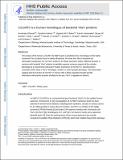C21orf57 is a human homologue of bacterial YbeY proteins
Author(s)
Davies, Bryan W.; Ghosal, Anubrata; Koehrer, Caroline; Babu, Vignesh M.P.; Yamanaka, Kinrin; Jacob, Asha I; Ferullo, Daniel J.; Gruber, Charley C; Vercruysse, Maarten; Walker, Graham C.; ... Show more Show less
Downloadnihms849846.pdf (1.143Mb)
PUBLISHER_CC
Publisher with Creative Commons License
Creative Commons Attribution
Terms of use
Metadata
Show full item recordAbstract
The product of the human C21orf57 (huYBEY) gene is predicted to be a homologue of the highly conserved YbeY proteins found in nearly all bacteria. We show that, like its bacterial and chloroplast counterparts, the HuYbeY protein is an RNase and that it retains sufficient function in common with bacterial YbeY proteins to partially suppress numerous aspects of the complex phenotype of an Escherichia coli ΔybeY mutant. Expression of HuYbeY in Saccharomyces cerevisiae, which lacks a YbeY homologue, results in a severe growth phenotype. This observation suggests that the function of HuYbeY in human cells is likely regulated through specific interactions with partner proteins similarly to the way YbeY is regulated in bacteria.
Date issued
2017-01Department
Massachusetts Institute of Technology. Department of BiologyJournal
Biochemical and Biophysical Research Communications
Publisher
Elsevier
Citation
Ghosal, Anubrata et al. “C21orf57 Is a Human Homologue of Bacterial YbeY Proteins.” Biochemical and Biophysical Research Communications 484, 3 (March 2017): 612–617 © 2017 Elsevier Inc
Version: Author's final manuscript
ISSN
0006-291X
1090-2104